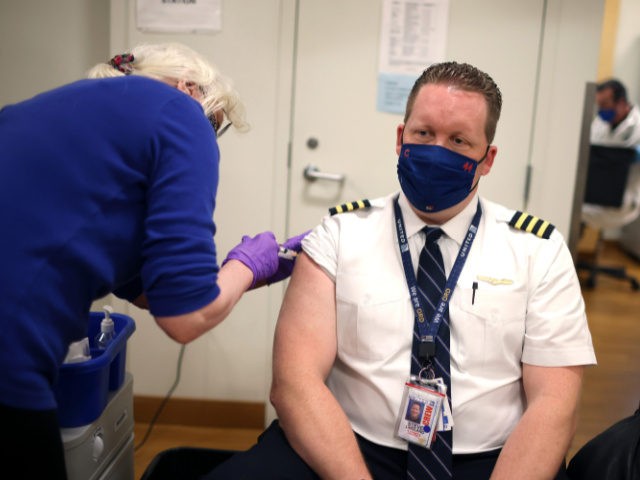A federal court denied a petition for rehearing in a case surrounding United Airlines’ vaccine mandate — one judge accusing the company of “coerc[ing] its employees into violating their religious beliefs.”
Judges for the United States Court of Appeals for the Fifth Circuit, widely considered the most conservative federal court, voted 13-4 on Thursday to deny a rehearing. The court also denied United Airlines’ request to vacate a panel opinion from February, which held that the mandate inflicted irreparable harm and remanded the case to district court.
Trump-appointed Judge James Ho penned a concurring opinion, admonishing the airline for creating a “crisis of conscience” for its employees, and warned of a new wave of corporatism in the United States that seeks to inflict its cultural values on Americans.
Ho wrote that mandating employees with sincere religious objections to take vaccines that “were developed using aborted fetal tissue” or face indefinite unpaid leave, is an “obvious irreparable injury” because it “press[ures employees] into violating one’s faith.” Ho said:
Being placed on indefinite unpaid leave because your employer doesn’t like your religious beliefs is obviously an adverse employment action and an actionable claim under Title VII of the Civil Rights Act of 1964. And you’ve obviously suffered irreparable injury when you’re forced to violate your faith in order to get your job back. The injury would be entirely reparable by money damages if it was just about a loss of money.”
But it’s not. It’s about a loss of faith. And it’s about a crisis of conscience. You’re being coerced into sacrificing your faith in order to keep your job. No measure of damages makes sense in this scenario. To keep your job, you must violate your faith. How much money would it take for you to sell out your faith?
Notably, United Airlines had one of the strictest coronavirus vaccine mandates in the country for a private company, even compared to competing airlines. Last August, the airline told its 67,000 U.S. employees that they would have to get vaccinated against the virus or face firing. United reported that roughly 96 percent complied with the mandate, though several hundred who refused were fired. Approximately 2,200 employees received religious and medical exemptions, though that consisted of the company granting them what it called a “reasonable accommodation” by placing them on unpaid leave and stripping them of their medical benefits.
The mandate resulted in an ongoing lawsuit. In September 2021, six United Airlines employees sued the company over the mandate in a class action lawsuit on behalf of the 2,200 seeking exemptions, alleging the company violated Title VII of the Civil Rights Act of 1964 and the Americans with Disabilities Act (ADA) by discriminating against them based on their religious beliefs and medical conditions.
The case is back in the hands of District Judge Mark Pittman, who is also a Trump appointee. However, the airline allowed unvaccinated staff to return to work on March 28, citing a “steep decline” in coronavirus cases as the reason for the policy change.
Ho emphasized that “courts should hold [corporations] accountable, no less and no more than individuals.” He added:
Corporations are not people. But like people, corporations are capable of following the law as well as violating it. Moreover, by combining and coordinating human efforts, corporations can do a lot more. They can have a greater impact on society than most individuals. As a result, corporations can achieve far greater good—and cause much greater harm. So when corporations violate the law, courts should hold them accountable, no less and no more than individuals.
Ho also noted that if this case is “pathbreaking,” it is not because of how law is being applied but because of the “behavior of industry.”
“Historically, corporations typically focus on increasing shareholder value—not on imposing certain cultural values on others. But that is rapidly changing,” he said.
Ho pitched a hypothetical situation in which an employer who does not care about employee productivity “insists that you abandon certain religious beliefs he finds offensive, whether it’s abortion, marriage, sexuality, gender, or something else.”
“But here’s the thing: What was once hypothetical is now rapidly becoming reality. Examples of this abound,” he wrote, citing various news stories as examples. “So this case may be the first, but I suspect it will not be the last.”
Ho further cited a passage from Woke, Inc.: Inside Corporate America’s Social Justice Scam, about how “companies use their market power to make moral rules, they effectively prevent . . . other citizens from having the same say in our democracy.” He wrote:
My point today is less ambitious: We know what this new corporate trend is doing to employees. It’s violating the religious convictions of workers across the country. And in cases like this, the injuries are irreparable. So unlike the dissent, I’m grateful that our court is taking the action it is today.
“And unlike the dissent, I don’t think our circuit will be alone, as cases like this inevitably multiply across the country, assuming corporate trends persist. But if our circuit turns out to be alone in its defense of religious liberty, I’ll be grateful for our actions today all the same, ” he concluded.
The case is Sambrano v. United Airlines, No. 21-11159 in the U.S. Court of Appeals for the Fifth Circuit.

COMMENTS
Please let us know if you're having issues with commenting.